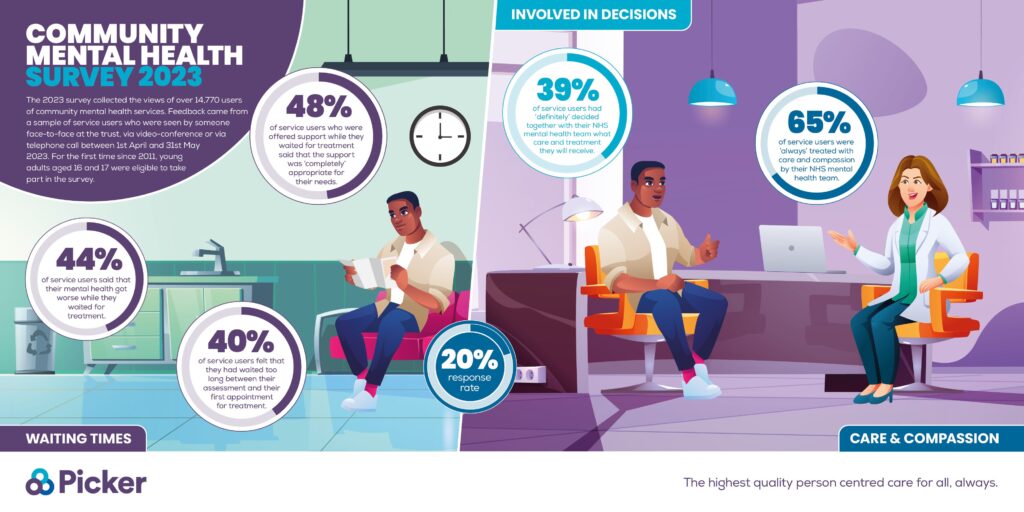Mental health services struggle to meet demand, according to a major survey
The results of the Community Mental Health Survey 2023 come at a time when access to and the quality of mental health care continues to be a concern and public satisfaction with the NHS and social care is reported to be at a 40-year low. The results from this survey do little to alleviate these concerns.
The Community Mental Health Survey 2023 – coordinated by Picker for the Care Quality Commission – collected feedback from more than 14,700 people in contact with services between April and May 2023. For the first time since 2011 young adults aged 16 and 17 were eligible to take part in the survey and respondents using Child and Adolescent Mental Health Services (CAMHS) could be identified.
The survey is an important source of information to help us understand the quality of person centred care provided to mental health service users: this includes experiences of accessing treatment and the impact of waiting.
Waiting times contribute to worsening mental health
Delayed help for mental health problems can have a detrimental impact on individuals, their friends and families, and the survey found this to be a widespread issue with the results for respondents using CAMHS particularly worrying. People who had been in contact with NHS mental health services for up to two years were asked how they felt about the waiting time between assessment and first appointment for treatment. Overall, 40% said the waiting time was too long. This increased to 61% for CAMHS users who completed the survey.
When asked about changes in mental health during this time, 44% (60% for survey respondents using CAMHS) said their mental health had got worse – and results were poorer for people who reported longer waits. More than two thirds (70%) of those who had to wait more than six months between assessment and first appointment said their mental health had got worse, compared to only 27% who had waited less than two weeks.
Users’ inclusion in treatment and care limited
Questions were also asked about care planning, seeking to explore the support service users received to make decisions. Respondents were asked if they decided what care or treatment they would receive together with their NHS mental health team. Only 39% reported that this was “definitely” the case, highlighting that there is still some way to go to achieve the type of collaborative, participatory care set out in the community mental health framework for adults and older adults.
We see further room for improvement in some of the other core relational aspects of care covered in the survey. Just over a half (56%) of CAMHS users who completed the survey said they were “always” treated with care and compassion by their NHS mental health team and 55% said they were always treated with respect and dignity by NHS mental health services (compared to a still unimpressive 65% of all survey respondents for each of these questions), leaving many young adults noting this was not always the case.
Commenting on the results, Jenny King, Picker’s Chief Research Officer, said:
The results of the Community Mental Health Survey 2023 paint a picture of services struggling to meet ever increasing demand, and the impact of this is being felt by service users trying to access care. The standard of person centred mental health care as highlighted by this survey should be a concern for all.
We welcome the inclusion of people aged 16 and 17 in the survey for the first time in more than a decade, supporting the investigation of the responsiveness of community mental health services to the specific needs of young adults. This recognises that young adults often have needs and expectations that differ to other adult users. One of the key benefits of a national experience survey is the ability to explore the experiences of different groups of people and the results tell us that in many areas CAMHS respondents reported poor levels of care.
Ends
Notes for Editors
- The survey is commissioned and published by the Care Quality Commission, the independent regulator of all health and social care services in England.
- People were eligible for the survey if they were aged 16 or over, were seen face-to-face (including via video conference) or had a telephone consultation between 1st April and 31st May 2023, and had had at least one other contact with mental health services either before, during, or after this period. People who were seen only once for an assessment were not included; nor were people primarily receiving care from any of the following services: drug and alcohol; learning disabilities; specialist forensic; Improving Access to Psychological Therapies (IAPT); chronic fatigue/ME; psychosexual medicine; gender identity; or memory clinics.
- The survey was conducted between August and December 2023. 14,770 people responded, a response rate of 20%. This included responses from 758 people who used CAMHS.
- Changes to methodology, terminology and questions used in the survey mean it is not possible to compare this year’s results with data collected in previous years.
- Details about how the survey was administered and full results are available at https://nhssurveys.org/surveys/survey/05-community-mental-health/year/2023/
- Picker’s team of researchers and data scientists are available to support organisations in understanding, measuring, and using workforce and user experience. For queries about our services or to request a call, please contact info@pickereurope.ac.uk.
- For media enquiries, please contact the Marketing & Communications Manager at Picker, Lorraine Pullen pressoffice@pickereurope.ac.uk Mobile: 07825 952160
- To view the Picker survey infographic click here

